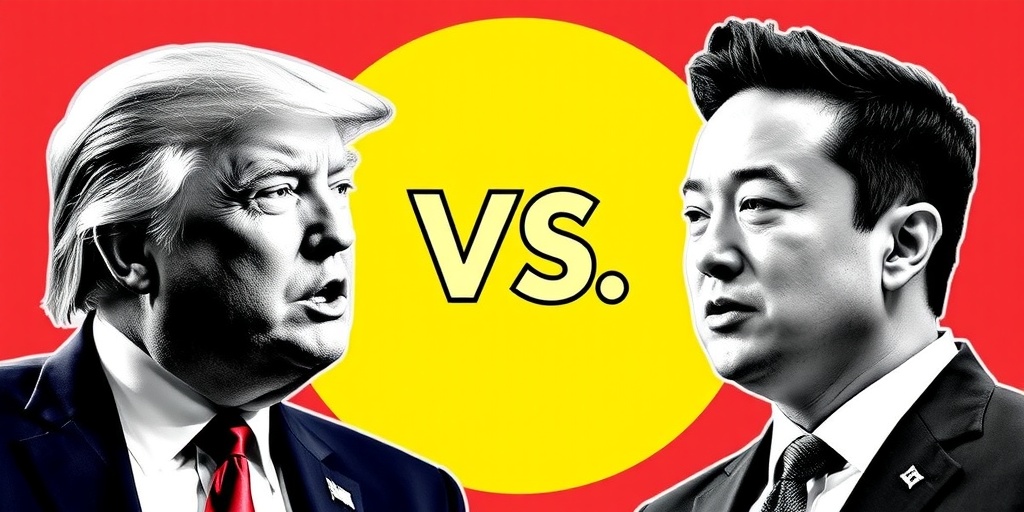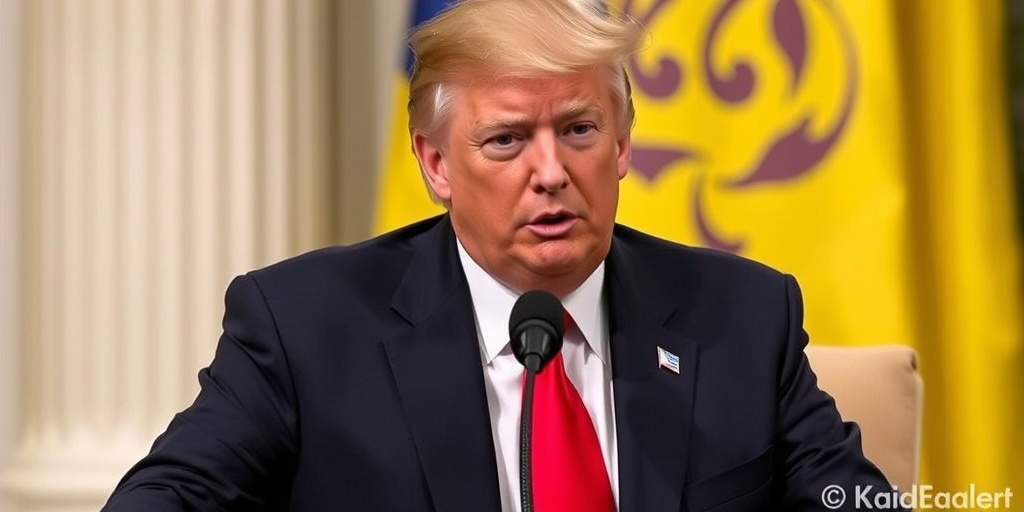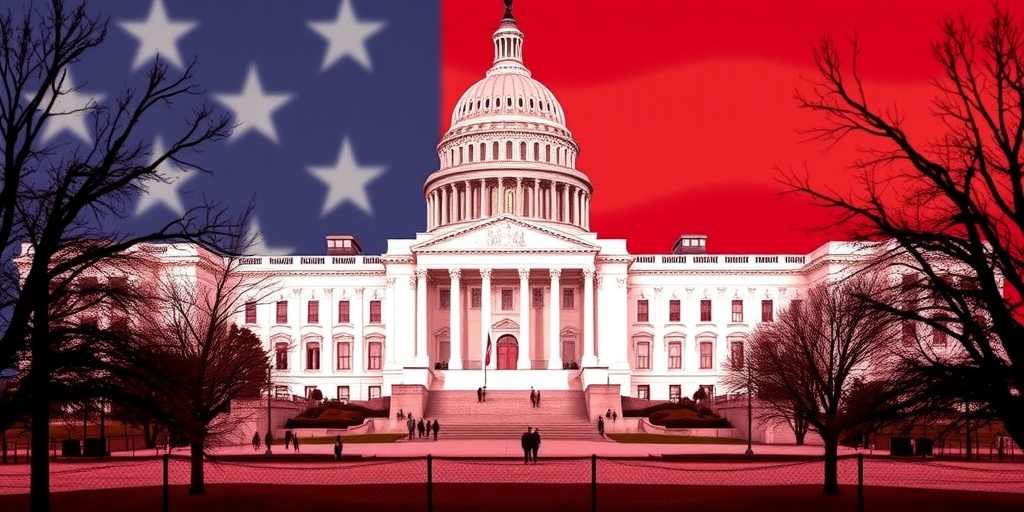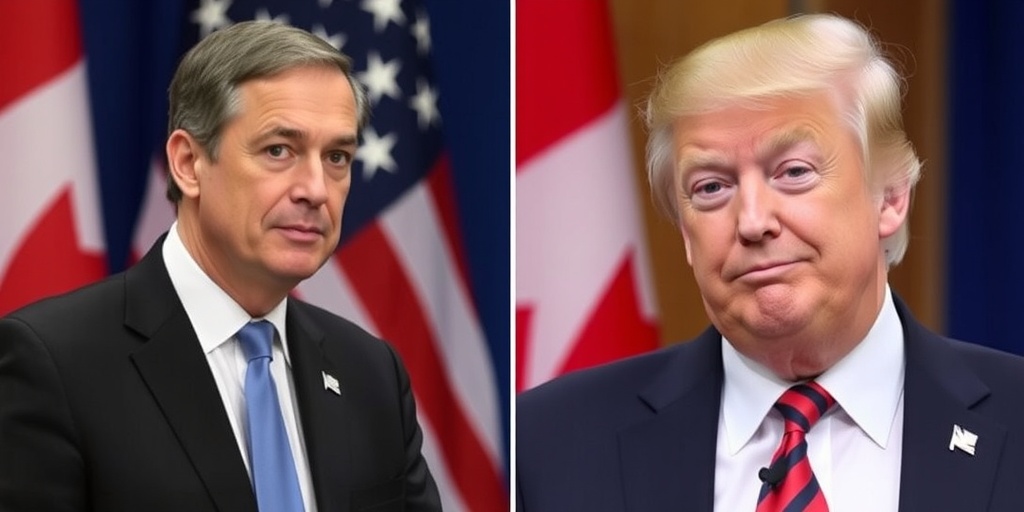Now Reading: Trump vs. Musk: Who Has the Greater Economic Pain Tolerance?
-
01
Trump vs. Musk: Who Has the Greater Economic Pain Tolerance?
Trump vs. Musk: Who Has the Greater Economic Pain Tolerance?

Market Turmoil: A Challenging Day for Trump and Musk Amid Trade Policy Concerns
Today marked a tumultuous day for both President Trump and entrepreneur Elon Musk, as the stock market faced one of its worst downturns of the year. This unsettling turn of events for the stock market came on the heels of President Trump’s comments regarding his trade policies, which have sparked fears of a potential recession. He expressed uncertainty about whether the aggressive tariffs he is proposing against key trading partners such as Canada and Mexico might contribute to economic instability. This is a significant concern for a president who campaigned on promises to enhance the economy rather than undermine it.
Simultaneously, Elon Musk’s companies, particularly Tesla, suffered noticeable setbacks. Amid declining sales figures and escalating protests regarding his connection to Trump’s administration, Tesla’s stock plummeted to levels not seen since before the 2024 election. By midday, shares had dropped more than 15 percent, painting a grim picture for investors and stakeholders alike.
Musk has always displayed resilience under pressure. After acquiring Twitter for $44 billion, the company’s value swiftly declined as both advertisers and users migrated away from the platform. While there has been a slight recovery in user engagement possibly due to Musk’s association with Trump, Tesla has faced financial struggles in the past, including a near-bankruptcy situation early in its history. Musk’s ambitious venture, SpaceX, also flirted with failure following a series of unsuccessful launches between 2006 and 2008, a period Musk refers to as essential for growth where high-profile mistakes are acceptable in the quest for innovation.
In an interview with biographer Walter Isaacson, Musk articulated his philosophy towards risk-taking: “We don’t want to design to eliminate every risk,” he stated. “Otherwise we will never get anywhere.” His willingness to embrace risk contrasts sharply with the traditional caution expected from political leaders, who must ensure their policies favor economic stability to maintain voter approval.
Recently, Trump seemed to echo Musk’s risky calculus, suggesting the possibility of a "little disturbance" in the economy due to his proposed tariffs while hinting at potential "transitional periods." This assertion implies that Trump may be preparing for short-term economic volatility for the sake of longer-term gains, echoing Musk’s view that some sacrifices are necessary for eventual success.
However, history suggests that most political leaders are inclined to avoid decisions that could alienate their voter base. Trump’s apprehensions regarding the political fallout from today’s market plunge reflect a common fear among politicians: instability fosters unrest, which can jeopardize political capital.
The looming question now is whether Trump is prepared to endure the potential economic pain akin to Musk’s journey or if he will temper his trade policies in hopes of stabilizing the market. As the day unfolded, it became increasingly clear that the stakes are high for both men—Musk’s reputation and business prospects hinge upon the national sentiment surrounding Trump’s controversial strategies.
Meanwhile, in the political arena, Musk attempted to mend fences with Secretary of State Marco Rubio after a recently heated disagreement at a cabinet meeting. Musk took to his X account (the new identity of Twitter) to portray a united front, suggesting that tensions between them have dissipated. Their public exchange of friendly remarks aimed to distract from Musk’s significant cuts to the United States Agency for International Development (USAID), alongside Rubio’s attempts to regain control of the department.
This friendly repartee starkly contrasts with previous contentions. During the recent cabinet meeting, tensions boiled as Musk faced criticism for measures that affected government funding and staffing. However, in a show of teamwork on X, Rubio acknowledged budget cuts to USAID, attributing some of the changes to Musk’s Department of Government Efficiency efforts, while Musk offered a nod of gratitude in his response.
Yet, Musk still faces unresolved conflicts within the cabinet, including with Transportation Secretary Sean Duffy, who objected to what he termed Musk’s aggressive push for administrative cuts potentially affecting air traffic control in light of recent aviation incidents.
Despite the storm brewing in the financial markets and the administrative discord, there sits a silver lining for Tesla amid Trump’s proposed tariffs. While Musk navigates an environment increasingly fraught with protests, potentially impacting Tesla’s sales, a different facet of Trump’s trade policies could benefit Musk’s electric vehicle manufacturer. Unlike competitors such as General Motors and Ford, which have substantial operations in Mexico that might expose them to tariff fallout, Tesla manufactures all its vehicles within the United States.
This domestic manufacturing strategy positions Tesla favorably, providing insulation against price hikes from tariffs. Furthermore, the political landscape may provide opportunities for Tesla, should competitors be forced to increase their prices significantly in order to absorb trade penalties.
As this saga continues, it remains critical to observe how these developments will shape both the fortunes of Musk’s empire and Trump’s administration, especially as the consequences of trade policy ripple through the economy. The road ahead promises to be a challenging one for both figures, but their ability to adapt and respond to the evolving political and economic landscape may dictate their future successes.
Stay Informed With the Latest & Most Important News
Previous Post
Next Post
-
 01New technology breakthrough has everyone talking right now
01New technology breakthrough has everyone talking right now -
 02Unbelievable life hack everyone needs to try today
02Unbelievable life hack everyone needs to try today -
 03Fascinating discovery found buried deep beneath the ocean
03Fascinating discovery found buried deep beneath the ocean -
 04Man invents genius device that solves everyday problems
04Man invents genius device that solves everyday problems -
 05Shocking discovery that changes what we know forever
05Shocking discovery that changes what we know forever -
 06Internet goes wild over celebrity’s unexpected fashion choice
06Internet goes wild over celebrity’s unexpected fashion choice -
 07Rare animal sighting stuns scientists and wildlife lovers
07Rare animal sighting stuns scientists and wildlife lovers





















